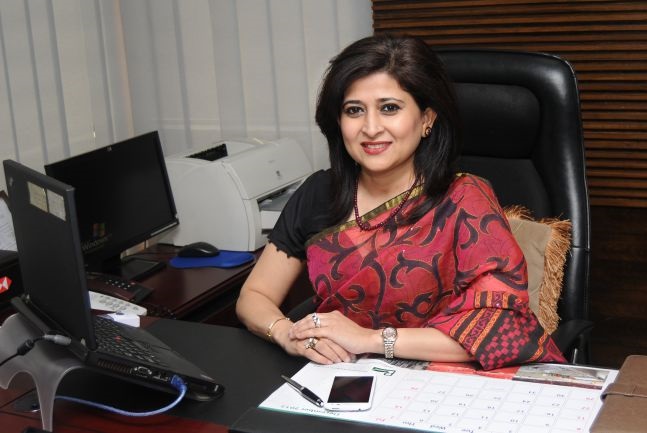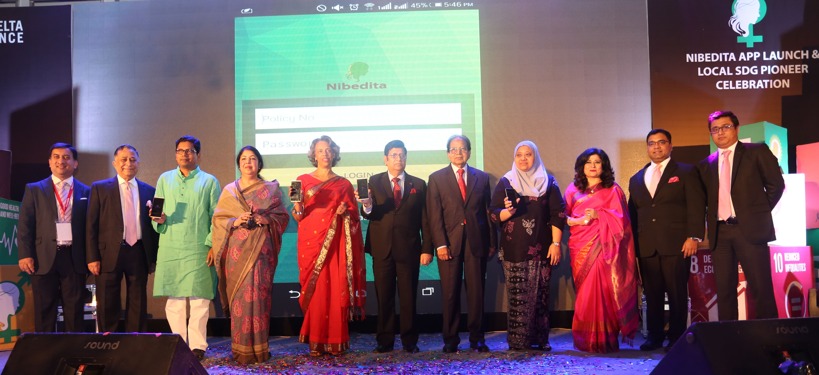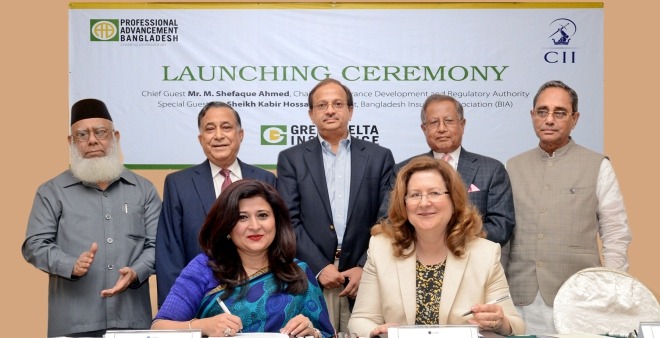

Award-winning Managing Director and CEO of Green Delta Insurance Company Limited, Farzana Chowdhury, reflects on her early career life, the importance of taking initiative and creating one’s own identity and taking responsibility, her journey from Banking to Insurance, and why it is incredibly satisfying to follow one’s passion and never give up.
Future Startup
I want to dive in at the beginning of your story. Tell us about yourself.
Farzana Chowdhury
My parents, with their philosophy of women empowerment, have shaped my entire life. I was fortunate that I didn't have to face any kind of discrimination in terms of education or freedom as a daughter. My life was quite smooth. This has led me to actively avoid a mundane life.
I was into a number of co-curricular activities including dance, painting, and sport. In fact, I missed my place in national basketball team due to my poor height.
After my intermediate exam, I chose to go into the business discipline despite my science background. Initially, it was difficult for me to adjust to the new discipline of business but I managed to overcome through hard work. I was inspired by my father when he decided to leave his job and start his own business.
I eventually completed post-graduation in 1993 and joined Scholastica as a teacher in 1994. It was my first job, so to speak. Teaching is a wonderful profession, of course. But soon I realized that it was not my cup of tea. I left that job after 2 and a half year.
In 1997, I joined BRAC. It seemed very challenging at first. But I was determined to do something meaningful. When I was given a choice, I immediately chose to work with credit and micro-finance because I'm a finance major.
Luckily, my superior Mr. Aminul Alam was a veteran in the micro-financing field. But when I asked him about my responsibilities, he told me to find my own job. I fell from the sky. Yes, I had academic knowledge, but BRAC was a large organization and working there required a considerable amount of practical knowledge, which I didn't have. So, I thought to dive deep into the organization's basics.
I learned about BRAC's microfinance projects and the sectors they were working in. I took the responsibility to educate myself on the microfinance and all. Half a month passed, anybody yet to assign me a job. I was almost done with all reading materials and getting bored doing nothing at the office.
Finally, I went to the CFO out of utter desperation and asked him to give me something to work on. Then, he asked me to prepare a business plan. I did it with sheer excitement. I was excited that I finally got a job to do.Then on, I used to find works on my own.
Whenever someone called in sick, I came forward to fill in for that person.
This is how I started to get more engaged in the work. During that time a US-based consultancy firm was testing a model for employee performance analysis jointly with BRAC. I was a part of that project. They organized a 7-day training workshop for us to test the model and had plans to run it country-wide if it was successful.
Surprisingly, at the end of the training, I was chosen to run the project together with another colleague. It was quite challenging as we had to stay in a remote area in Rajshahi for 3 weeks. Initially, my superior, Mr. Alam, was reluctant to send me since he did not believe that I could live alone because I'm a woman. But I insisted on continuing.
That journey was quite something for me. It completely changed my outlook in many ways. It changed my view about village life and made me realize that there was so much to do.
After returning to Dhaka, things started to change real fast. I began to train branch managers on this new model besides my work in the microfinance division. At that time I trained 450 branch managers in total. And, within 3 months, I got an opportunity to join an international microcredit summit which gave me good exposure.
After working for a few years at BRAC, I was thinking of higher studies and an opportunity came. I enrolled in a 2-year MBA program in Australia with an AusAID Scholarship to refresh my academic knowledge. BRAC was considerate enough to make an exception for me and allow me two years leave for the study.
There I learned how to work in a team, lead a team, be assertive about own contribution and be focused.I Also learned that if you're a woman, you may need to work twice as hard as your male counterparts.
After my post-graduation, I came back to Bangladesh and returned to BRAC. When BRAC Bank started, I joined SME Banking division. In SME banking, our plan was to serve those entrepreneurs who were treated as unbankable by the mainstream banks.
[blockquote source=]That was a remarkable learning opportunity for me. I visited the projects that were being funded with SME loans. I was head of SME for 7 years, the sector grew exponentially. I was heading around 3,000 people across the country. Our portfolio was valued at BDT 70 million which was almost 60% of the total portfolio of BRAC Bank.[/blockquote]
Initially, the main problem was a low number of loan applications due to mortgage requirement. Top management was under pressure with this project and fired few of my bosses.
As a solution, I proposed to remove mortgage requirement and increase the interest rates slightly to make-up for the risk. They agreed on my proposal and we started to provide non-mortgage loans up to Tk. 300,000. And, we observed that the borrowers were paying monthly installments on time.
That was a remarkable learning opportunity for me. I visited the projects that were being funded with SME loans. I was head of SME for 7 years, the sector grew exponentially. I was heading around 3,000 people across the country. Our portfolio was valued at BDT 70 million which was almost 60% of the total portfolio of BRAC Bank. Of course, there were a few rough patches along the way, but I managed to survive and learned a lot.

Future Startup
You were talking about the exponential growth of SME Banking at BRAC Bank, what strategies you applied to drive that early growth?
Farzana Chowdhury
Simply put, the key is to learn by doing things. We were lucky to have Mr. Abed who was and is a visionary leader. We had a value system at BRAC. There's a checklist there. Every 3/4 months we used to judge our performance on the basis of this policy.
We worked hard to learn about target segment and their needs. We came to realize in no time that they were very simple people, hard working and straightforward and wanted service only. As they were underserved by the conventional banks, we gave them hassle free, non-collateral loans with prompt disbursement. It was the main competitive advantage and differentiating factor.
The challenge we faced was that we were growing very fast but didn't have enough time to process the experience and actually learned from it. We had to go with our instinct. So, it was, in a sense, a bank within a bank. When I started working in the SME department, there were only 13 employees. And, when I left, it was a family of more than 3,000 people.
[blockquote source=]We worked hard to learn about target segment and their needs. We came to realize in no time that they were very simple people, hard working and straightforward and wanted service only. As they were underserved by the conventional banks, we gave them hassle free, non-collateral loans with prompt disbursement. It was the main competitive advantage and differentiating factor.[/blockquote]
Future Startup
How did your transition to insurance happen?
Farzana Chowdhury
I left BRAC in 2009. As I have been a director of Green Delta from before, and the management insisted me, I joined Green Delta Insurance.In fact, prior to joining Green Delta, I designed, developed and implemented a successful business model for SME insurance for the SME department of BRAC Bank while I was working there.
Despite, when I joined Green Delta, initially, I went through a lot of challenges and had to educate myself on the field. I worked hard and prepared myself. I did a Diploma from
Malaysia Insurance Institute (DMII) in 2013 and am a member of CII (Chartered Insurance Institute) in the UK. Earlier this year I was awarded the prestigious Chartered Insurer Status by the CII (UK).
After 6 months of my joining, I realized that there were so many things to do. I decided to use my experience from working in microfinance to bring about a few changes in the company such as fixing issues with MIS, making computer usage mandatory, cutting cost, introducing better communication method. I faced lots of pressure as people are hardly willing to adjust to changes.
I also started working in product development, set up R&D department; stir up a culture of periodical ManCom meeting.
This is how my journey in the insurance industry began. After a while I realized that the Green Delta has no clear positioning in the market despite being a pioneer in the sector, so we launched a branding campaign. This helped our business significantly and helped us to attract new talents.
We have also strengthened our auditing and the underwriting department and standardized the process. We have partnered with IFC in 2011 who was looking for ways to getting into the insurance industry in Bangladesh.
After becoming the CEO, I thought that it is important to set the course of the business for the next 2-3 decades. I worked on my understanding and realized that the business needs innovation and technology to sustain and that there are other opportunities where we could embark on.
As a part of that plan, we launched two new subsidiaries: Professional Advancement Bangladesh Limited (PABL)and Green Delta Assist Ltd.

Future Startup
Give us a brief overview of Green Delta Insurance.
Farzana Chowdhury
Currently, we are the largest non-life insurance company in the country with AAA rating. We have also received the international ARC award very recently. You can find details about our products and services on our website.
Green Delta is trusted for its claim payments and maintaining a moral code. We now champion the motto of Insurance for Everyone.
We started GD Assist as a result where we represent Malaysian hospitals. GD Assist is also working for the overall development of healthcare experience. We have other projects in retail and we have launched ‘Nibedita’, an insurance scheme particularly designed for women.
Future Startup
How many people are working at Green Delta now? Tell us a bit about your organizational culture.
Farzana Chowdhury
We are a 600+ member team at GD now. We don't have that much hard and fast authoritative environment here. We have succeeded in creating a performance-driven culture where we try to blend the elderly people with the youth so that everyone can learn from everyone.
Future Startup
What is your management philosophy?
Farzana Chowdhury
I want to be a people's leader. I want to create system and culture where people will maintain discipline, have mutual respect for each other, perform optimally and act ethically. We don't have a pyramid structure here. My door is open to everyone meaning that anyone can reach me for any need.
I like for the employees to think the organization as a family and work passionately. Speed is one of the key habits I’m trying to build into the DNA of Green Delta. We try not to put something off for the next day.
Future Startup
How do you reach out to your target customers?
Farzana Chowdhury
We connect to the different parts of the country through our branches. Currently, we have 39 branches across the country. We have added more layers in the personnel structure recently expanding our foothold across the country.
There are zonal heads and branch managers who look after their respective zones and branches. The retail team currently work from the head office. We are extending the service to the branches as well.
We are trying better use the data that we collect about our users. We communicate the data to managers and marketing professionals in their business, thanks to our robust MIS system. Unfortunately, we still don't have a market index for the insurance industry, and we wish to work with 360-degree information in the future.
Future Startup
There has been a lot of talk about the low penetration of insurance industry recently. What's your take on that?
Farzana Chowdhury
I think with the expansion of the retail sector, we can steer up the market penetration from 15% to 22%. There are also many companies who are yet to be insured. We need to create that awareness in the rural areas.
We are trying to tap more of the market through innovative insurance schemes (like Nibedita) and alternative distribution channels. we are working with different telecom companies, banks, non-bank financial institutions, and retail outlets as well to increase our coverage.

Future Startup
GD has been on top of the game for a number of years? What are the drivers behind this?
Farzana Chowdhury
Innovation is the key driving force in the industry. If we don't tap potential sectors like IT, the competitors will take the place. Technology will bring efficiency and cost-reduction. We have always tried to make sure that we innovate, we serve our customers better and we evolve as a company.
We continuously look for ways to improve ourselves and the business. This has been one of the greatest contributors to our growth. Leadership and a great team have also bee important driving factors.
To sum up, our growth drivers are our human resources, our economic growth as a country, our commitment level, and transparent corporate governance.
Future Startup
What kind of challenges do you see now?
Farzana Chowdhury
We have human resource crisis. Young people don’t feel motivated to work in the insurance industry. Young people need to know about insurance sector so that they feel motivated to work here.
There are also some regulatory issues. A number of amendments need to be taken right away. Unless we will have to face difficulty in the future.
Customer awareness is by far the biggest and most prevalent challenge in the insurance sector. There is a negative connotation as well in the market. Many people in Bangladesh still don't know how much benefit they would get from an insurance. Of course, people won't become all concerned overnight, but we need to take steps to gradually reach to that level.
Other critical challenges include management, lack of training facilities, infrastructure, and software integration.
Having said that, there will always be challenges in the market. But as a perpetual optimist, I like to see them as opportunities. They are opportunities for us to grow. I think the future demands us to be one-stop destinations. In line with my thought, Green Delta aspires to become a point where you can get everything: access to information, access to finance, access to education, and access to training, and so on. That's the kind of future we envision.
[blockquote source=]I want to create system and culture where people will maintain discipline, have mutual respect for each other, perform optimally and act ethically. We don't have a pyramid structure here. My door is open to everyone meaning that anyone can reach me for any need.[/blockquote]
Future Startup
Tell us about Nibedita.
Farzana Chowdhury
When I became the CEO of Green Delta, I’m the first woman CEO in the industry, I wanted to do something to help women.
Nibedita is a special insurance scheme. You see, women in our country live a very insecure life. Nibedita helps these women.
There are many features in this scheme such as Trauma allowance for women who have been the victim of violence. We designed an app for this and getting a good response from the market.
The app helps our customer in different ways, such as seeking immediate help from law enforcers in the case of emergency. We have partnered with Elite force for the security matter. Nibedita is the first ever comprehensive insurance scheme for women in South Asia.
Future Startup
Career-wise, what is the biggest risk you have taken in your life?
Farzana Chowdhury
Coming to a different industry (from microfinance to insurance) is definitely the biggest risk I've taken so far.. That change forced me to be more adaptable and acceptable in a totally new workspace.
Future Startup
What advice would you offer to a young person just getting started?
FarzanaChowdhury
Although, it sounds cliche, follow your passion. Never give up. And don't ever think that you've learned enough.
Leadership is also a crucial quality of an entrepreneur. A good leader is someone who dreams herself/himself and inspires others in the team to dream the same thing. It's very important for an entrepreneur to have vision and
Maintain a proper work/life balance. You have to be able to maintain your family and your professional life efficiently.
Health plays a vital role in everything we do. If you're not healthy, you can't perform better. This is why I don't generally allow employees to work overtime because health comes first.
Interview by Ruhul Kader, Transcription by Rahatil Ashekan, Edited by Nezam Uddin and Ruhul Kader
____________
About the Partner: This story is made possible in part by our friends at BetterStories Limited, a premium future building agency that works in the areas of Information Technology, Strategic Consulting and Entrepreneurial Ecosystems Building, based in Dhaka, Bangladesh, whose generosity enables us to publish premium stories online at no cost to our readers. Thank you, BetterStories, for teaming up with us in 2016.
